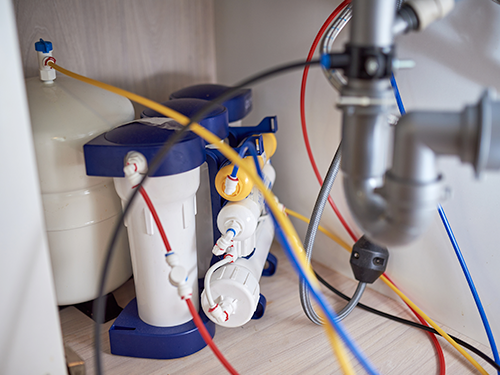For many homeowners who rely on private wells, water quality is a serious concern. One of the growing threats to clean, safe drinking water is contamination from PFAS, a group of synthetic chemicals that have been linked to health risks and environmental harm. Understanding what PFAS are, how they can affect your well water, and what steps you can take to protect your family is, therefore, very important.
What Are PFAS?
PFAS stands for per- and polyfluoroalkyl substances, a large group of human-made chemicals used in manufacturing for their resistance to heat, oil, grease, and water. Since the 1940s, they’ve been used in products like non-stick cookware, water-repellent clothing, firefighting foams, and food packaging.
The problem? PFAS don’t break down easily. Often called “forever chemicals,” they persist in the environment and accumulate in water, soil, wildlife, and even the human body.
How Do PFAS Get Into Well Water?
PFAS can enter groundwater in several ways:
- Industrial sites that manufacture or use PFAS
- Landfills where PFAS-containing products are discarded
- Wastewater treatment plants that process contaminated water
- Firefighting training facilities that use foam products with PFAS
For homeowners who depend on private wells, the risk can be especially serious. Unlike public systems, private wells are not regulated by the EPA, which means you are responsible for testing and maintaining your water quality.
Why PFAS in Well Water Is a Health Concern
Research has linked PFAS exposure to various health effects, including thyroid hormone disruption, immune system suppression, increased cholesterol levels, kidney and testicular cancers, pregnancy complications, and developmental effects in infants and children. Even low levels of PFAS can be harmful over time because they build up in the body.
How to Know if Your Well Water Has PFAS
1. Testing Is the First Step
If your home is near known PFAS sites (industrial areas, military bases, landfills), it’s important to test your well water. While some states have created their own PFAS guidelines, the EPA’s health advisory level is 4 parts per trillion (ppt) for PFOA and PFOS, two common PFAS compounds.
2. Signs of Risk (Without Testing)
While PFAS are odorless, colorless, and tasteless, potential signs that you might be at risk include nearby industrial or chemical plants, local water contamination advisories, or unexplained health issues that could relate to chemical exposure.
Effective PFAS Water Treatment Options
Fortunately, there are proven solutions to reduce PFAS in your well water. At Kel Tren WaterCare, we specialize in customized systems that deliver long-lasting protection.
1. Activated Carbon Filtration
Granular Activated Carbon (GAC) filters are highly effective at adsorbing PFAS. They’re especially useful for longer-chain PFAS like PFOA and PFOS. These systems are ideal for whole-house treatment or point-of-use (POU) at the kitchen sink. However, make sure to maintain and replace filters as recommended, as their performance declines over time.
2. Reverse Osmosis Systems
Reverse Osmosis (RO) is a powerful filtration method that forces water through a semipermeable membrane, removing PFAS and many other contaminants. RO systems are typically installed under the sink and are perfect for drinking and cooking water.
3. Ion Exchange Resins
Ion exchange systems swap out PFAS ions with harmless ones. These systems can be customized for high-capacity PFAS removal, making them suitable for high-use households or severe contamination levels.
Why Choose Kel Tren WaterCare?
At Kel Tren WaterCare, we’ve been helping homeowners protect their water for several years. Our PFAS expertise, certified systems, and local experience make us a trusted partner in water treatment. Here’s what sets us apart:
- Customized treatment plans based on your unique water chemistry
- Certified PFAS-reducing systems from leading manufacturers
- Ongoing support with maintenance and testing guidance
- Fast, friendly service with expert technicians who care
What Homeowners Should Do Now
Schedule a Water Test
The first step in protecting your home from PFAS contamination is knowing whether it’s present in your water. Even if you’ve never tested before, it’s not too late. Our team offers accurate, lab-grade testing to detect even trace amounts of harmful compounds.
Consult With a Water Treatment Expert
Once your results are in, we’ll walk you through them. You’ll get personalized recommendations based on your specific water profile and budget, so you can make informed decisions.
Install and Maintain Your System
From point-of-entry filters to under-sink reverse osmosis units, we provide expert installation and reliable service plans. Our goal is long-term protection, so your system is always running effectively, season after season.
Stay Informed
PFAS regulations and awareness are evolving. We keep you updated on changes from the EPA and state authorities, and recommend annual water testing or immediate retesting if your area experiences known contamination events.
Your Health Starts With Your Water
PFAS contamination in well water is a serious issue, but it’s one that you can take control of. Whether you’re just beginning to research or you’re ready to act, Kel Tren WaterCare is here to help you every step of the way. With our expertise in PFAS filtration, well water treatment, and customer-first service, you can trust us to help protect your health and your home. Contact us today for a free consultation or to schedule your water test.




